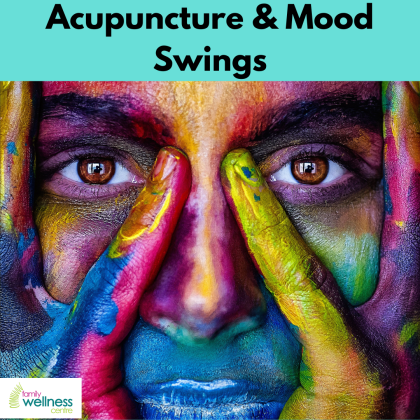"Can Acupuncture help with Mood swings?" is a common question I get. In this article, we'll explain more about how Acupuncture may assist in helping you feel less stressed, more calm and an overall, improved wellbeing.
In short, Yes, acupuncture may be an effective complementary therapy for managing mood swings.
Traditional Chinese Medicine (TCM), which includes acupuncture, views mood swings mainly as an imbalance in the Shen (spirit).
The wholistic nature of Acupuncture and TCM means they look at the body as a whole. They don't separate the mind, body and spirit in their clinical assessment. Symptoms in one area may impact on another, for instance mental stress relates to tight muscles in the physical body.
Another example might be emotional stress (anxiety or nervousness or even anger), relates to why someone may have digestive upset. An experienced practitioner is constantly looking for the connections between symptoms to make a TCM pattern diagnosis. Once you get to the treatment part of the consultation...
Here's how acupuncture can help with mood swings:
1. Regulating Neurotransmitters: Acupuncture has been shown to influence the release and regulation of neurotransmitters like serotonin and dopamine, that is to say, they play crucial roles in mood regulation. This can help stabilise mood and ease mood swings.
2. Balancing Hormones: Acupuncture can stimulate the hypothalamus-pituitary-adrenal axis, which helps regulate hormone levels in the body. This can be particularly beneficial for individuals experiencing mood swings because of hormonal fluctuations.
3. Reducing Stress and Anxiety: Acupuncture activates the parasympathetic nervous system, promoting relaxation and reducing stress levels. This can have a positive impact on mood stability.
4. Enhancing Blood Flow: By promoting better circulation of blood and Qi, acupuncture helps nourish the brain and balance its functions, which can contribute to improved emotional well-being.
5. Harmonising Yin and Yang: In TCM, mood swings are often associated with imbalances in the Yin (nourishing, feminine energy) and Yang (active, masculine energy). Acupuncture aims to restore equilibrium between these opposing forces.
It's important to note that while acupuncture can be a valuable tool in managing mood swings, to clarify, it is typically used as part of a comprehensive treatment plan. This plan may include other modalities like counselling, lifestyle adjustments, and potentially medication if deemed necessary by a doctor.
If you're considering acupuncture for mood swings, it's crucial to consult a Registered acupuncturist or a healthcare professional with experience in integrating acupuncture into mental health care. As a result, they can provide a treatment plan tailored to your specific needs and circumstances.
To make an appointment on Sydney's Northern Beaches you can book online here.
Other reading on mood swing and Traditional Chinese Medicine:
Perimenopause and Menopausal Transition


